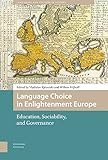Language choice in Enlightenment Europe : education, sociability, and governance / edited by Vladislav Rjéoutski and Willem Frijhoff.
Material type: TextSeries: Publication details: Amsterdam : Amsterdam University Press, (c)2018.Description: 1 online resource (232 pages)Content type:
TextSeries: Publication details: Amsterdam : Amsterdam University Press, (c)2018.Description: 1 online resource (232 pages)Content type: - text
- computer
- online resource
- 9789048535507
- 9048535506
- P140 .L364 2018
- COPYRIGHT NOT covered - Click this link to request copyright permission: https://lib.ciu.edu/copyright-request-form
| Item type | Current library | Collection | Call number | URL | Status | Date due | Barcode | |
|---|---|---|---|---|---|---|---|---|
 Online Book (LOGIN USING YOUR MY CIU LOGIN AND PASSWORD)
Online Book (LOGIN USING YOUR MY CIU LOGIN AND PASSWORD)
|
G. Allen Fleece Library ONLINE | Non-fiction | P140 (Browse shelf(Opens below)) | Link to resource | Available | on1041854320 |
Browsing G. Allen Fleece Library shelves, Shelving location: ONLINE, Collection: Non-fiction Close shelf browser (Hides shelf browser)
Includes bibliographies and index.
This multinational collection of essays challenges the traditional image of a monolingual Ancient Regime in Enlightenment Europe, both East and West. Its archival research explores the important role played by selective language use in social life and in the educational provisions in the early constitution of modern society. A broad range of case studies show how language was viewed and used symbolically by social groups - ranging from the nobility to the peasantry - to develop, express, and mark their identities.
Cover; Table of Contents; Introduction; Vladislav Rjéoutski and Willem Frijhoff; Learning Vernaculars, Learning in Vernaculars; The Role of Modern Languages in Nicolas Le Gras's noble academy and in teaching practices for the nobility (France, 1640-c.1750); Andrea Bruschi (Università di Verona); Dutch foreign language use and education after 1750; Routines and innovations; Willem Frijhoff (Erasmus University, Rotterdam); Practice and functions of French as a second language in a Dutch patrician family; The van Hogendorp family (eighteenth-early nineteenth centuries)
Madeleine van Strien-Chardonneau (University of Leiden) (Translated by Mary Robitaille-Ibbett)Multilingualism versus proficiency in the German language among the administrative elites of the Kingdom of Hungary in the eighteenth century; Olga Khavanova (Institute of Slavic Studies, Russian Academy of Sciences, Moscow); Voices in a country divided; Linguistic choices in early modern Croatia; Ivana Horbec and Maja Matasović (Croatian Institute of History, Zagreb); Introducing the teaching of foreign languages in grammar schools
A comparison between the Holy Roman Empire and the Governorate of Estonia (Estonia)Michael Rocher; Latin in the education of nobility in Russia: The history of a defeat; Vladislav Rjéoutski (Deutsches Historisches Institut Moskau); Latin as the language of the orthodox clergy in eighteenth-century Russia; Ekaterina Kislova (Moscow State University); Index
COPYRIGHT NOT covered - Click this link to request copyright permission:
There are no comments on this title.







